French singer France Gall has died at the age of 70 after suffering from cancer for two years. She rocketed to fame in the 1960s as a naive young singer performing songs written by Serge Gainsbourg. In 1965 she won the Eurovision Song Contest with his 'Poupée de cire, poupée de son'. But, after meeting and marrying, French singer-songwriter Michel Berger, her career was completely turned around and she soon went on to make a name for herself as one of the top female artists on the French music scene.
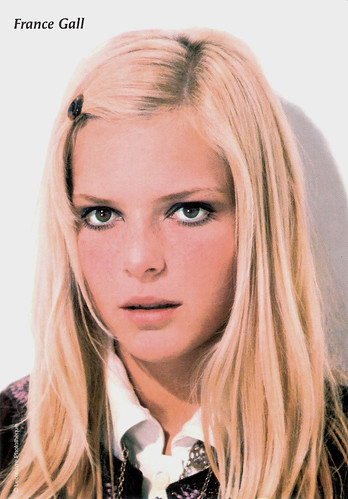
French postcard by Universal Collections for L'Encyclopédie de la Chanson Française, 2003.
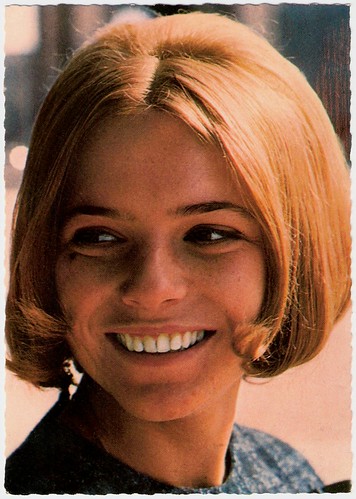
French postcard by Editions Publistar, Marseille, no. 1086. Photo: P. Bertrand.
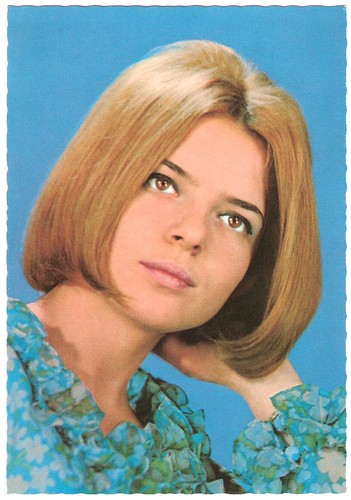
German postcard by ISV, no. H 120. Photo: Philips France.
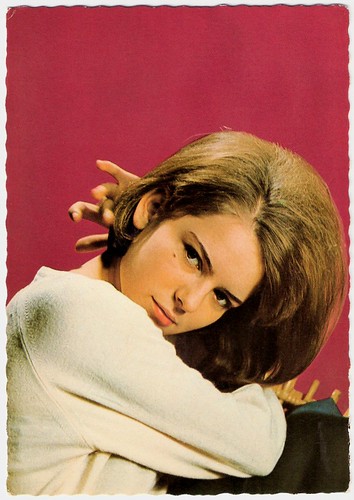
French postcard by PSG, no. 947. Photo: Aubert-Philips.
Isabelle Geneviève Marie Anne Gall was born in Paris in 1947. She grew up in a highly creative musical environment. Her father was lyricist Robert Gall, who wrote hits for Edith Piaf and Charles Aznavour, and her mother was singer Cécile Berthier, the daughter of Paul Berthier, the organist of Auxerre Cathedral and co-founder of the famous French children's choir Petits Chanteurs à la Croix de Bois.
Isabelle learned to play the piano and the guitar at an early age. In her early teens, Isabelle went on to form her own group with her brothers. In 1963, Robert Gall encouraged his daughter to record songs and send the demos to musical publisher Denis Bourgeois. She auditioned for Bourgeois at the Théâtre des Champs-Élysées in Paris and was subsequently signed to Philips. Bourgeois let her record four tracks with French jazz musician, arranger and composer Alain Goraguer. The first airplay of her first single 'Ne sois pas si bête' (Don't Be So Silly), occurred on her 16th birthday. It soon rocketed to the top of the French charts, selling a cool 200,000 copies. She went on to make a major name for herself during the yé-yé craze (the fashionable 1960s sound which fused Anglo-Saxon rock'n'roll with French variété).
Bourgeois asked legendary singer/songwriter Serge Gainsbourg to write songs for Gall. Gainsbourg's 'N'écoute pas les idoles' (Don't listen to the idols) became Gall's second single; it reached the top of the French charts in March 1964. At the same time, Gall made her live debut, opening for Sacha Distel in Belgium. She teamed up with Distel's business manager, Maurice Tézé, who was also a lyricist. This allowed her to create an original repertoire, unlike the majority of her yé-yé contemporaries who sang adaptations of Anglophone hits. Gall's songs often featured lyrics based on a stereotypical view of the teenage mind. Elaborate orchestrations by Alain Goraguer blended styles, permitting her to navigate between jazz, children's songs, and anything in between. Examples of this mixed-genre style are 'Jazz à gogo' and 'Mes premières vraies vacances'.
In the summer of 1964, Gall and Gainsbourg's association produced the hit song 'Laisse tomber les filles' (Forget the girls) followed by 'Christiansen'. Having previously resisted, Gall gave in to her managers at the end of 1964 and recorded a single intended for children. The song 'Sacré Charlemagne' was a hit in 1965, selling 2 million copies. Gall was then selected to represent Luxembourg in the 1965 Eurovision Song Contest. Out of the 10 songs proposed to her, she chose Gainsbourg's 'Poupée de cire, poupée de son'. On 20 March 1965, Gainsbourg, Gall, and Goraguer attended the finals of the song contest in Naples, where the song was booed during rehearsals. Her performance was broadcast live to an audience of 150 million viewers and although Gall's delivery during the live show was not of the highest standard, she went on to triumph in style.
Success at Eurovision ensured that Gall became even more known outside Europe and she recorded 'Poupée de cire, poupée de son' in French, German, Italian and Japanese. There appears to be no English version released by France Gall herself, although there was an English cover by the English 60s star Twinkle. Some French critics reproached Gall and Gainsbourg for having won for Luxembourg and not for their own country, but 'Poupée de cire, poupée de son' went on to become a huge hit in France.

French postcard by PSG offered by Corvisart, no. 441. Photo: G. Neuvecelle / Philips.
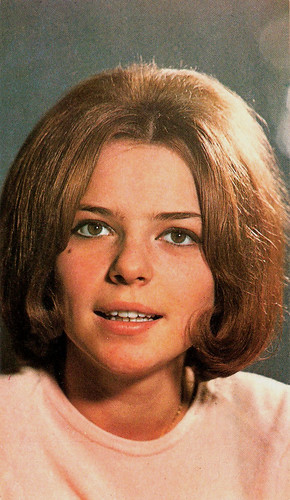
French postcard by Publistar offered by Corvisart, no. 943. Photo: Philips.
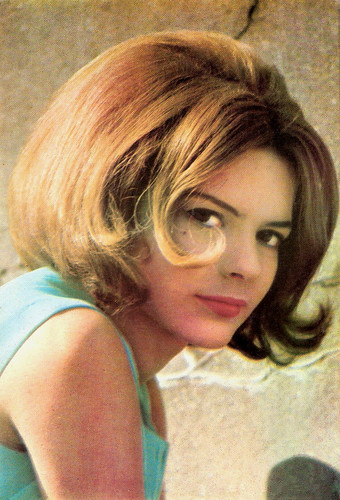
French postcard by Ed. Borde, no. 100. Photo: Wiezniak / Philips.
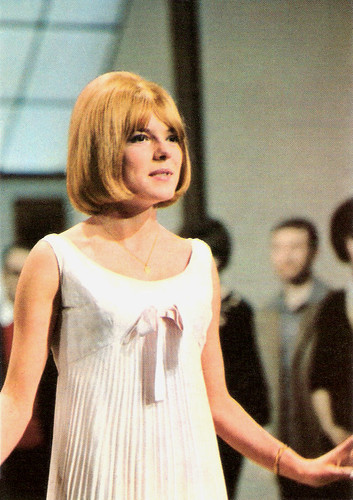
Italian postcard. Photo: Phonogram.
In 1965 a TV film was distributed in the United States directed by Jean-Christophe Averty and dedicated to the songs of France Gall. She was then sought by Walt Disney to appear as Alice in a musical film version of Alice in Wonderland. Although Gall had insisted she did not want to become involved in film work, this was the only project which appealed to her, but the project was cancelled after Disney's death in 1966.
That year, France Gall was voted France's no. 1 female pop star. She went on to score another huge hit with 'Bébé Requin' (Baby Pop), a song co-written by Gainsbourg and Joe Dassin. Later Gall described the lyrics as ‘brutal’, but the dark undertones are not easily perceived when one hears the song as sung by the then 18-year-old girl.
However, the undertones in her next hit song were not so easily missed and caused a scandal when it was released. Gainsbourg deliberately filled the song 'Les Sucettes' (Lollipops) with double meanings and strong sexual innuendo. Gall performed the song in the television film Viva Morandi (1966), made in the same psychoanalytical mould as the Fellini film Giulietta degli Spiriti/Juliette of the Spirits (Federico Fellini, 1965). Gall played La Grâce alongside Christine Lebail who played La Pureté, and both sang Les Sucettes in a clear reference to the song's sexual undertones.
On the surface, the lyrics tell the innocent tale of a girl named Annie who enjoys lollipops. However, it is clear that Gainsbourg intentionally created the theme as a metaphor for oral sex. Although a big hit, the song sat in stark contrast to genuinely innocent songs on the same album such as 'Je me marie en blanc' (White Wedding) and 'Ça me fait rire' (It makes me laugh). The public furore over 'Les Sucettes' would throw Gall’s career off-track for years, and Gall was not left unscathed by the experience. She belatedly understood that she had been used: the song was deliberately conceived to attract publicity.
All her records which followed, even expunged of the Gainsbourg signature, would be suspiciously viewed as having crass commercial motivations. Her song dedicated to John Fitzgerald Kennedy Jr., Bonsoir John John would be tarred with accusations of necrophilia. Sullied by her association with Gainsbourg, her songs failed to chart for a long time afterwards. When she was later approached by director Bernardo Bertolucci for the leading female role in the sexually explicit Last Tango in Paris (1972), she firmly rejected his offer.
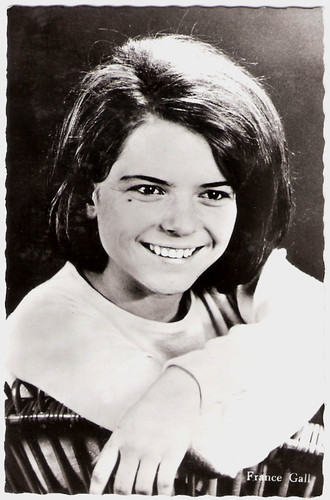
Dutch Postcard by Rembrandt N.V., Amsterdam. Photo: Phonogram.
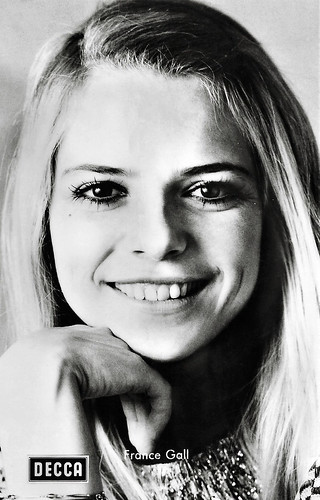
German postcard by Kolibri-Verlag, Minden, no. 3052. Photo: Teldec / Michael Foth / Decca.
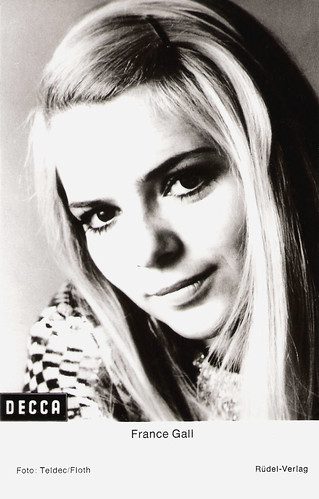
German postcard by Rüdel-Verlag, Hamburg-Bergedorf, no. 5050. Photo: Teldec / Foth / Decca.
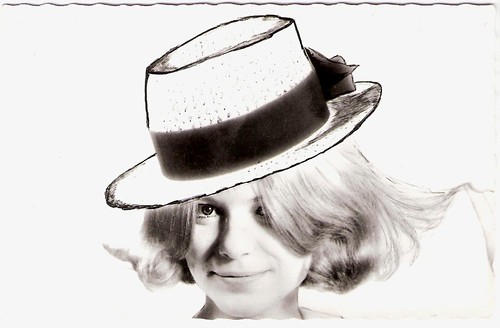
Dutch postcard, no. 1392. Photo: Phonogram.
Although struggling in her home country, France Gall regularly recorded in Germany from 1966 to 1972, in particular with the composer and orchestrator Werner Müller. She had a successful German career with songs by Horst Buchholz and Giorgio Moroder: 'Love, l'amour und liebe' (1967), 'Hippie, hippie' (1968), 'Ich liebe dich, so wie du bist' (I love you the way you are) (1969) and 'Mein Herz kann man nicht kaufen' (My heart is not for sale) (1970). Gall had several other releases in France in 1968, none of which aroused any great interest.
At the end of 1968, on reaching the age of 21, Gall separated from Denis Bourgeois and stretched her wings upon the expiration of her contract with Philips. The early seventies continued to be a barren period for Gall. Although she was the first artist to be recorded in France for Atlantic Records in 1971, her singles 'C'est cela l'amour' (1971) and 'Chasse neige' (1971), faltered in the charts. In 1972, Gall, for the last time, recorded songs by Gainsbourg, 'Frankenstein' and 'Les Petits ballons', but these also failed to chart.
She remained firmly in the media spotlight though, dating 1960s idol Claude François, then going on to enjoy a four-year relationship with another popular French singing star, Julien Clerc (1970-1974). 1974 proved to be a major turning point in France Gall's personal life as well as in her professional career. She then first met the French singer/songwriter Michel Berger. Shortly after this initial meeting Berger and Gall began a passionate relationship, and the couple would rarely be seen apart. Berger created a whole new repertoire for her and France Gall soon made a major comeback on the French music scene, rocketing to the top of the charts with her new single 'La Déclaration' in 1974. This proved to be the first of many hits which Berger wrote especially for Gall. Each of the singer's successive albums would contain several best-selling hits. Meanwhile, their relationship became serious and in 1976 they married.
In 1988 her hit 'Ella, elle l'a' (Ella She Has It), a tribute to Ella Fitzgerald, topped the charts in many countries. After Berger’s sudden death in 1992, France Gall continued to perform her late husband's repertoire. In 1993, Gall once again considered appearing on screen for a cinematographic collaboration with her best friend, the screenplay writer Telsche Boorman. Like the Disney film, this planned project was never completed due to the death of Boorman in 1996.
Gall and Berger had two children, Pauline and Raphaël. In 1997, tragedy blighted her life once again, when her daughter Pauline died at the age of 19. Gall retired, but in 2004 a new compilation was released, 'Evidemment' and proved to be another huge hit. Gall's songs were often featured on film soundtracks, like 'Poupée de cire, poupée de son' in Ba'al Ba'al Lev/Gotta Have Heart (Eytan Fox, 1997), 'Teenie Weenie Boppie' in A Soldier's Daughter Never Cries (James Ivory, 1998) and 'Besoin d'amour' in 40 mg d'amour par jour/40 mg of love each day (Charles Meurisse, 2005).In the mid-1990s, France Gall had been diagnosed with breast cancer. For the last two years, France Gall again suffered from the disease. Last month, she was taken to the American Hospital of Paris, in Neuilly-sur-Seine, for a severe infection. The singer passed away there on Sunday morning 7 January 2018.
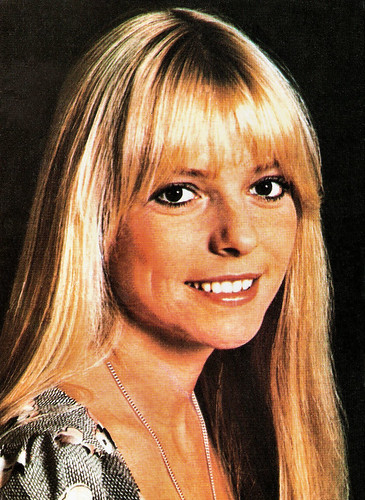
Romanian postcard by Casa Filmului Acin, no. 414.
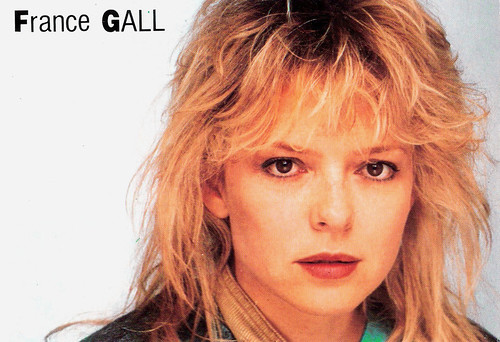
French postcard by Editions Champs Libres ST 115, 1989.
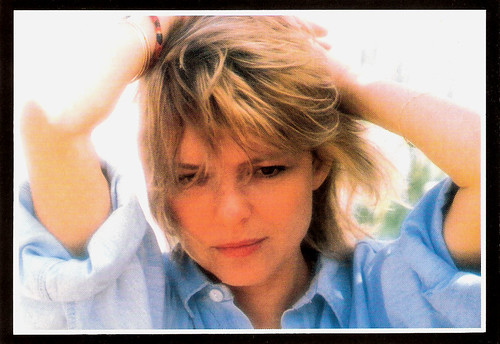
French postcard by Éditions Damilla, Paris, no. 94931. Photo: Tony Frank (SIGMA).
France Gall sings 'Poupée de cire, poupée de son' at the 1965 Eurovision Song Contest. Source: Bradchalk (YouTube).
Sources: Radio France Internationale Musique (French), Wikipedia and IMDb.
This post was last updated on 30 April 2024.

French postcard by Universal Collections for L'Encyclopédie de la Chanson Française, 2003.

French postcard by Editions Publistar, Marseille, no. 1086. Photo: P. Bertrand.

German postcard by ISV, no. H 120. Photo: Philips France.

French postcard by PSG, no. 947. Photo: Aubert-Philips.
Yé-yé craze
Isabelle Geneviève Marie Anne Gall was born in Paris in 1947. She grew up in a highly creative musical environment. Her father was lyricist Robert Gall, who wrote hits for Edith Piaf and Charles Aznavour, and her mother was singer Cécile Berthier, the daughter of Paul Berthier, the organist of Auxerre Cathedral and co-founder of the famous French children's choir Petits Chanteurs à la Croix de Bois.
Isabelle learned to play the piano and the guitar at an early age. In her early teens, Isabelle went on to form her own group with her brothers. In 1963, Robert Gall encouraged his daughter to record songs and send the demos to musical publisher Denis Bourgeois. She auditioned for Bourgeois at the Théâtre des Champs-Élysées in Paris and was subsequently signed to Philips. Bourgeois let her record four tracks with French jazz musician, arranger and composer Alain Goraguer. The first airplay of her first single 'Ne sois pas si bête' (Don't Be So Silly), occurred on her 16th birthday. It soon rocketed to the top of the French charts, selling a cool 200,000 copies. She went on to make a major name for herself during the yé-yé craze (the fashionable 1960s sound which fused Anglo-Saxon rock'n'roll with French variété).
Bourgeois asked legendary singer/songwriter Serge Gainsbourg to write songs for Gall. Gainsbourg's 'N'écoute pas les idoles' (Don't listen to the idols) became Gall's second single; it reached the top of the French charts in March 1964. At the same time, Gall made her live debut, opening for Sacha Distel in Belgium. She teamed up with Distel's business manager, Maurice Tézé, who was also a lyricist. This allowed her to create an original repertoire, unlike the majority of her yé-yé contemporaries who sang adaptations of Anglophone hits. Gall's songs often featured lyrics based on a stereotypical view of the teenage mind. Elaborate orchestrations by Alain Goraguer blended styles, permitting her to navigate between jazz, children's songs, and anything in between. Examples of this mixed-genre style are 'Jazz à gogo' and 'Mes premières vraies vacances'.
In the summer of 1964, Gall and Gainsbourg's association produced the hit song 'Laisse tomber les filles' (Forget the girls) followed by 'Christiansen'. Having previously resisted, Gall gave in to her managers at the end of 1964 and recorded a single intended for children. The song 'Sacré Charlemagne' was a hit in 1965, selling 2 million copies. Gall was then selected to represent Luxembourg in the 1965 Eurovision Song Contest. Out of the 10 songs proposed to her, she chose Gainsbourg's 'Poupée de cire, poupée de son'. On 20 March 1965, Gainsbourg, Gall, and Goraguer attended the finals of the song contest in Naples, where the song was booed during rehearsals. Her performance was broadcast live to an audience of 150 million viewers and although Gall's delivery during the live show was not of the highest standard, she went on to triumph in style.
Success at Eurovision ensured that Gall became even more known outside Europe and she recorded 'Poupée de cire, poupée de son' in French, German, Italian and Japanese. There appears to be no English version released by France Gall herself, although there was an English cover by the English 60s star Twinkle. Some French critics reproached Gall and Gainsbourg for having won for Luxembourg and not for their own country, but 'Poupée de cire, poupée de son' went on to become a huge hit in France.

French postcard by PSG offered by Corvisart, no. 441. Photo: G. Neuvecelle / Philips.

French postcard by Publistar offered by Corvisart, no. 943. Photo: Philips.

French postcard by Ed. Borde, no. 100. Photo: Wiezniak / Philips.

Italian postcard. Photo: Phonogram.
Alice in Wonderland
In 1965 a TV film was distributed in the United States directed by Jean-Christophe Averty and dedicated to the songs of France Gall. She was then sought by Walt Disney to appear as Alice in a musical film version of Alice in Wonderland. Although Gall had insisted she did not want to become involved in film work, this was the only project which appealed to her, but the project was cancelled after Disney's death in 1966.
That year, France Gall was voted France's no. 1 female pop star. She went on to score another huge hit with 'Bébé Requin' (Baby Pop), a song co-written by Gainsbourg and Joe Dassin. Later Gall described the lyrics as ‘brutal’, but the dark undertones are not easily perceived when one hears the song as sung by the then 18-year-old girl.
However, the undertones in her next hit song were not so easily missed and caused a scandal when it was released. Gainsbourg deliberately filled the song 'Les Sucettes' (Lollipops) with double meanings and strong sexual innuendo. Gall performed the song in the television film Viva Morandi (1966), made in the same psychoanalytical mould as the Fellini film Giulietta degli Spiriti/Juliette of the Spirits (Federico Fellini, 1965). Gall played La Grâce alongside Christine Lebail who played La Pureté, and both sang Les Sucettes in a clear reference to the song's sexual undertones.
On the surface, the lyrics tell the innocent tale of a girl named Annie who enjoys lollipops. However, it is clear that Gainsbourg intentionally created the theme as a metaphor for oral sex. Although a big hit, the song sat in stark contrast to genuinely innocent songs on the same album such as 'Je me marie en blanc' (White Wedding) and 'Ça me fait rire' (It makes me laugh). The public furore over 'Les Sucettes' would throw Gall’s career off-track for years, and Gall was not left unscathed by the experience. She belatedly understood that she had been used: the song was deliberately conceived to attract publicity.
All her records which followed, even expunged of the Gainsbourg signature, would be suspiciously viewed as having crass commercial motivations. Her song dedicated to John Fitzgerald Kennedy Jr., Bonsoir John John would be tarred with accusations of necrophilia. Sullied by her association with Gainsbourg, her songs failed to chart for a long time afterwards. When she was later approached by director Bernardo Bertolucci for the leading female role in the sexually explicit Last Tango in Paris (1972), she firmly rejected his offer.

Dutch Postcard by Rembrandt N.V., Amsterdam. Photo: Phonogram.

German postcard by Kolibri-Verlag, Minden, no. 3052. Photo: Teldec / Michael Foth / Decca.

German postcard by Rüdel-Verlag, Hamburg-Bergedorf, no. 5050. Photo: Teldec / Foth / Decca.

Dutch postcard, no. 1392. Photo: Phonogram.
A barren period
Although struggling in her home country, France Gall regularly recorded in Germany from 1966 to 1972, in particular with the composer and orchestrator Werner Müller. She had a successful German career with songs by Horst Buchholz and Giorgio Moroder: 'Love, l'amour und liebe' (1967), 'Hippie, hippie' (1968), 'Ich liebe dich, so wie du bist' (I love you the way you are) (1969) and 'Mein Herz kann man nicht kaufen' (My heart is not for sale) (1970). Gall had several other releases in France in 1968, none of which aroused any great interest.
At the end of 1968, on reaching the age of 21, Gall separated from Denis Bourgeois and stretched her wings upon the expiration of her contract with Philips. The early seventies continued to be a barren period for Gall. Although she was the first artist to be recorded in France for Atlantic Records in 1971, her singles 'C'est cela l'amour' (1971) and 'Chasse neige' (1971), faltered in the charts. In 1972, Gall, for the last time, recorded songs by Gainsbourg, 'Frankenstein' and 'Les Petits ballons', but these also failed to chart.
She remained firmly in the media spotlight though, dating 1960s idol Claude François, then going on to enjoy a four-year relationship with another popular French singing star, Julien Clerc (1970-1974). 1974 proved to be a major turning point in France Gall's personal life as well as in her professional career. She then first met the French singer/songwriter Michel Berger. Shortly after this initial meeting Berger and Gall began a passionate relationship, and the couple would rarely be seen apart. Berger created a whole new repertoire for her and France Gall soon made a major comeback on the French music scene, rocketing to the top of the charts with her new single 'La Déclaration' in 1974. This proved to be the first of many hits which Berger wrote especially for Gall. Each of the singer's successive albums would contain several best-selling hits. Meanwhile, their relationship became serious and in 1976 they married.
In 1988 her hit 'Ella, elle l'a' (Ella She Has It), a tribute to Ella Fitzgerald, topped the charts in many countries. After Berger’s sudden death in 1992, France Gall continued to perform her late husband's repertoire. In 1993, Gall once again considered appearing on screen for a cinematographic collaboration with her best friend, the screenplay writer Telsche Boorman. Like the Disney film, this planned project was never completed due to the death of Boorman in 1996.
Gall and Berger had two children, Pauline and Raphaël. In 1997, tragedy blighted her life once again, when her daughter Pauline died at the age of 19. Gall retired, but in 2004 a new compilation was released, 'Evidemment' and proved to be another huge hit. Gall's songs were often featured on film soundtracks, like 'Poupée de cire, poupée de son' in Ba'al Ba'al Lev/Gotta Have Heart (Eytan Fox, 1997), 'Teenie Weenie Boppie' in A Soldier's Daughter Never Cries (James Ivory, 1998) and 'Besoin d'amour' in 40 mg d'amour par jour/40 mg of love each day (Charles Meurisse, 2005).In the mid-1990s, France Gall had been diagnosed with breast cancer. For the last two years, France Gall again suffered from the disease. Last month, she was taken to the American Hospital of Paris, in Neuilly-sur-Seine, for a severe infection. The singer passed away there on Sunday morning 7 January 2018.

Romanian postcard by Casa Filmului Acin, no. 414.

French postcard by Editions Champs Libres ST 115, 1989.

French postcard by Éditions Damilla, Paris, no. 94931. Photo: Tony Frank (SIGMA).
France Gall sings 'Poupée de cire, poupée de son' at the 1965 Eurovision Song Contest. Source: Bradchalk (YouTube).
Sources: Radio France Internationale Musique (French), Wikipedia and IMDb.
This post was last updated on 30 April 2024.
9 comments:
It seems that poupée de son was the tone, if you will, for much of her career. Kind of a shame, but with a mostly happy ending, anyway. You should write a book.
This is one of the unique and beatiful postcard I've ever seen. Thanks for sharing its information.
Boy oh boy Gainsbourg really rocketed her up and then dragged her down! Even I was shocked when I listened to the Les Sucettes song! It is scandalous even now! The videos were such a joy to watch! It's funny how she is sitting in a chair in the first one and how it ends with sporty credits! I didn't know that she was married to Michel Berger! Or that she dated Claude Francois! You are really changing the way I listen to the radio now... I hear these songs on the radio (Nostalgie) all the time but didn't know the background of course! Great work as always Bob!
France Gall is one of the French female singers I know best. It was a pleasure to read her life story on this blog together with her beautiful postcards! Thank you! :-)
Fascinating .. I had never heard of her
Of course, tomorrow night's the night! I have to confess I remember France Gall.
Thank you !
So much new information and new /old music to hear and enjoy.
Thank you for sharing all the fantastic background details.
Happy Postcard Friendship Friday .
have an awesome weekend.
Thank you for your reactions. You're kind. Tonight is the big night for the Eurovision Song Contest. De Toppers, the Dutch entry, were knock-out after the first round. Tonight Germany will be spectacular tonight with a special appearance by Miss Dita Von Teese. But I do hope France with Patricia Kaas will win. Douze Points de moi!
Nice!
Post a Comment